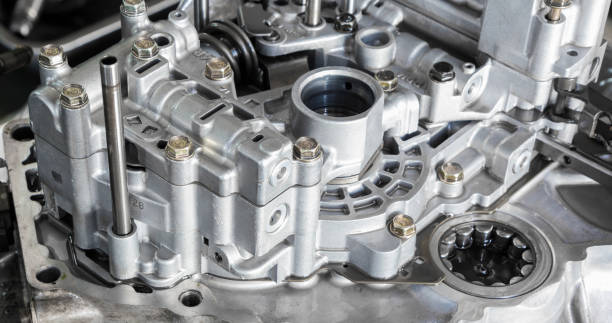The Single Strategy To Use For Aluminum Castings Company
Table of ContentsGet This Report on Aluminum Castings CompanyAluminum Castings Company - The FactsThe Aluminum Castings Company IdeasSome Known Facts About Aluminum Castings Company.Aluminum Castings Company - QuestionsThe Best Strategy To Use For Aluminum Castings CompanyRumored Buzz on Aluminum Castings CompanyTop Guidelines Of Aluminum Castings Company
There are two primary kinds of die spreading used in the aluminum spreading industry: warm chamber die casting and cold chamber pass away spreading. The primary difference in between these methods is exactly how the molten steel is delivered to the mold and mildew. In hot chamber die casting, typically used for lower melting factor steels, the fusion is directly connected to the device, and a bettor forces the product with a gooseneck right into the die cavity.
The Main Principles Of Aluminum Castings Company
In these approaches, the mold and mildew is purposefully ruined or damaged away in order to remove the completed light weight aluminum spreading. Typical processes under the group of expendable mold and mildew casting consist of (investment spreading),,, and financial investment spreading. When producing personalized aluminum parts using expendable molds, producers put molten aluminum or aluminum alloys right into the mold, which is then busted apart to launch the solidified steel component.
The is just one of the oldest and most utilized forms of light weight aluminum casting. It involves compacting specialized shop sand, usually strengthened with clay or material, around a specifically crafted multiple-use pattern that figures out the shape and internal details of the finished aluminum product. The pattern system includes risers and vents to manage the flow of molten metal and to avoid casting flaws such as shrinking porosity.
Aluminum Castings Company - Questions
This mold is after that preheated before the pouring of liquified aluminum or aluminum alloy. As the metal fills up the shell, it catches the intricate information and great surface area finish of the mold and mildew. Once cooled down, the ceramic is mechanically or chemically escaped, enabling the removal and splitting up of specific actors components.
Aluminum Castings Company for Dummies
Permanent mold spreading makes use of recyclable metal molds and is suitable for mass manufacturing with constant high quality and less waste. Expendable mold spreading makes use of single-use mold and mildews, like sand or foam, using design flexibility and reduced tooling prices for prototypes or brief runs. Die spreading is best for creating high volumes of aluminum components that call for tight resistances, fine information, and smooth surface areas.
The Toshiba Maker DC-J Collection includes pass away casting equipments appropriate for light weight aluminum. Understood for their robust construction and high shot performance, these equipments make certain reliable and precise spreading (Sand Mold).

While aluminum can be utilized in its pure kind, it is often alloyed with various other steels to enhance its homes or the residential or commercial properties of the various other metals. These alloys provide improved performance for different applications. Light weight aluminum alloys are categorized into 8 series, phoned number from one to 8. The initial digit(s) of the number suggest the key alloying component incorporated with light weight aluminum.
Aluminum Castings Company Things To Know Before You Get This
This alloying boosts the strength and firmness of light weight aluminum but decreases its ductility and rust resistance. The 2000 series alloys are testing to weld but can be warmth treated to boost their homes. The 3000 series alloys are mostly alloyed with manganese. This mix improves deterioration resistance while supplying modest toughness.
Additionally, it includes high ductility and a really smooth ended up surface area. The 4000 series alloys are alloyed with silicon, which reduces the melting point and enhances fluidity. This makes it a prominent option for spreading, as it is very easy to develop in its liquified state. The 4000 collection is additionally typically made use of as a filler for welding and brazing applications.
The 45-Second Trick For Aluminum Castings Company
This series is identified as a high-strength alloy, particularly suited for sheet and plate applications due to its outstanding weldability. Its resistance to corrosion from acids and alkalis makes it suitable for usage in rough and aggressive settings (Sand Mold). The 6000 series alloys are alloyed with both magnesium and silicon, providing an equilibrium of stamina, mechanical homes, and deterioration resistance
Handling the 6000 collection requires specialized and sophisticated equipment, which can be complex and expensive. However, this collection is understood for its exceptional corrosion and oxidation resistance, in addition to its convenience of finish, therapy, and workability. The 7000 series aluminum alloys are the best and most durable amongst light weight aluminum types, with toughness comparable to around two-thirds of industrial-grade A3 steel.
Little Known Facts About Aluminum Castings Company.
Zinc is the primary alloying component in the 7000 series, enhancing the firmness of the aluminum, despite the fact that zinc's hardness resembles that of aluminum on the Mohs scale. The 8000 collection light weight aluminum alloys are largely alloyed with tin, in addition to percentages of copper and nickel (Metal Castings). While these alloys use reduced strength contrasted to various other series, they master machinability and put on resistance
Light weight aluminum cast heatsinks are electrically conductive, allowing them to be based properly. They are commonly cast with integrated functions that lessen the need for secondary procedures, such as extra machining or setting up, causing more cost savings. Aluminum spreading is regularly utilized to make braces for both durable commercial equipment and house home appliances.
The 4-Minute Rule for Aluminum Castings Company
The single-piece building of light weight aluminum braces boosts their stamina and resilience, decreasing the possibility of failing. If holes are called for, they can be included directly in the more spreading mold and mildew, reducing the need for post-production completing (https://www.robertehall.com/profile/kelliphillips6140138212/profile). Suppliers have increasingly taken on aluminum spreading for golf tools as a result of its resilience, stability, and flexibility in shaping